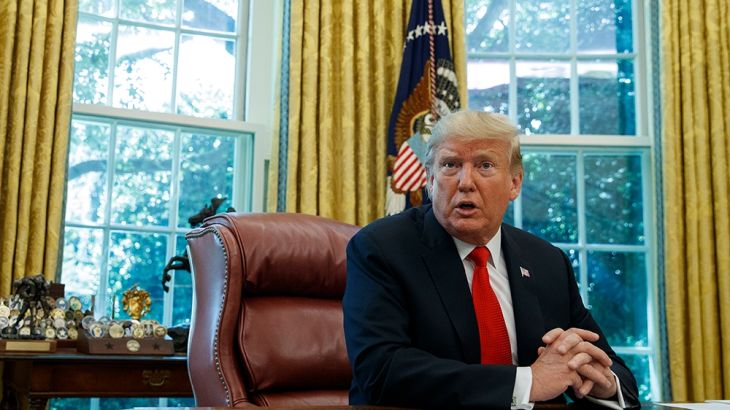Trump says he ‘called off’ peace talks with Taliban over attack
US president also says he cancelled secret meetings with Taliban and Afghan leaders planned for Sunday at Camp David.

US President Donald Trump has cancelled peace talks with Afghanistan’s Taliban leaders after the group said it was behind an attack in Kabul that killed an American soldier and 11 other people.
Trump made the announcement in a series of tweets, saying on Saturday he “called off” the peace negotiations and “cancelled” a secret meeting with the Taliban’s “major leaders” that was planned for Sunday at a presidential compound in Camp David, Maryland.
Keep reading
list of 4 itemsPhotos: Tourist numbers up in post-war Afghanistan
Taliban ban on girls’ education defies both worldly and religious logic
Afghanistan calls for ‘respect’ after Cricket Australia snub
Trump said he had also planned to meet Afghanistan‘s president.
“If they cannot agree to a ceasefire during these very important peace talks, and would even kill 12 innocent people, then they probably don’t have the power to negotiate a meaningful agreement anyway,” Trump tweeted, adding that the Taliban sought to “build false leverage”.
“I immediately cancelled the meeting and called off peace negotiations. What kind of people would kill so many in order to seemingly strengthen their bargaining position?” Trump said.
It is unclear if the US-Taliban talks are permanently over or only paused. US Secretary of State Mike Pompeo said on Sunday the negotiations “were dead for now”.
“I hope it’s the case the Taliban will change their behaviour and recommit to things we’ve talked about,” Pompeo told ABC television programme This Week.
‘Further harm’
The Taliban said on Sunday that Trump’s decision would lead to the further loss of American lives and assets.
“The Americans will suffer more than anyone else for cancelling the talks,” a statement said.
“This will further harm their credibility and will show their anti-peace stance in [a] more clear way. It will further harm US by treasure and human loss and their political credibility will lower in international political dealing.”
The US president has been under pressure from the Afghan government, politicians and some members of his administration who mistrust the Taliban and think it’s too early to withdraw US forces.
Following Trump’s announcement, Afghan President Ashraf Ghani’s office on Sunday said peace would only be possible if the Taliban stopped launching attacks and held direct talks with the government.
“Real peace will come when Taliban agree to a ceasefire,” it said.
Al Jazeera’s Tony Birtley, reporting from Kabul, said the Afghan government had been very concerned at the rapid pace with which the US appeared to be pursuing the peace process.
“They were concerned about all the concessions that the US were going to make,” he said.
“The Afghan government also wanted a ceasefire which has never been agreed between the Taliban and the US,” Birtley said, adding it did not sit well with Afghans that Trump “cancelled these talks for the loss of an American serviceman when each week in Afghanistan, hundreds of Afghan civilians are dying because of this war”.
Taliban fighters, who now control more territory than at any time since 2001, launched fresh assaults on the northern Afghan cities of Kunduz and Pul-e Khumri over the past week and carried out two major suicide bombings in the capital Kabul.
Elis A Barreto Ortiz, US Army sergeant, was killed in one of the blasts, bringing the number of US troops killed in Afghanistan this year to 16. A Romanian soldier was also killed.
Draft peace deal
Earlier this week, US and Taliban negotiators struck a draft peace deal that could lead to a withdrawal of US troops from the US’s longest war. But a wave of Taliban violence has cast a long shadow over a possible deal.
US Marine General Kenneth McKenzie, who oversees US troops in the region, declined to comment on the diplomatic negotiations themselves.
“It is particularly unhelpful at this moment in Afghanistan’s history for the Taliban to ramp up violence,” McKenzie, head of US Central Command, told reporters travelling with him.
McKenzie said for the peace process to move forward, “all parties should be committed to an eventual political settlement” which, in turn, should result in reduced violence.
“If we can’t get that going in, then it is difficult to see the parties are going to be able to carry out the terms of the agreement, whatever they might or might not be,” McKenzie said.
Under the draft accord, thousands of US troops would be withdrawn over the coming months in exchange for guarantees Afghanistan would not be used as a base for attacks on the US and its allies.
However, a full peace agreement to end more than 18 years of war would depend on subsequent “intra-Afghan” talks. The Taliban has rejected calls for a ceasefire and instead stepped up operations across the country.
The Taliban explained its surge in deadly attacks, which included the capitals of Kunduz and Baghlan provinces last weekend, as necessary to give it a stronger negotiating position in talks with the US.
For many Afghans, the Taliban’s recent escalation of attacks has underscored fears it may be impossible to reach a stable settlement following a complete US withdrawal.
Many have worried about a fracture along ethnic and regional lines.
Some Taliban members are based in neighbouring Pakistan, where McKenzie held talks on Saturday with a top Pakistani general. More talks are scheduled for Sunday.
McKenzie said he did not know whether any of the planning for the recent wave of attacks in Afghanistan came from Pakistan-based fighters.